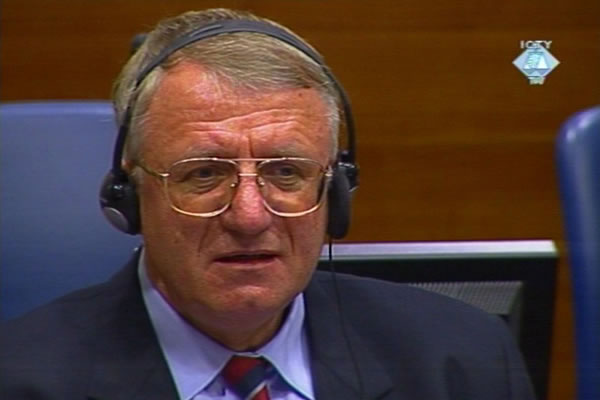Home
APPEAL AGAINST ‘UNWARRANTED INVESTIGATION’ OF INVESTIGATORS
The prosecution in the case against the Serbian Radical Party leader Vojislav Seselj urges the Appeals Chamber to revoke the decision of the Trial Chamber with Judge Antonetti presiding, which ordered an ‘unwarranted, vague and far-reaching investigation’ to be launched against ‘dozens of persons’, based on ‘spurious and incredible’ accusations made by persons with close ties to the political party of the accused
 Vojislav Seselj in the courtroom
Vojislav Seselj in the courtroom The prosecution in the case against the Serbian Radical Party leader Vojislav Seselj appealed against the decision of the Trial Chamber of 29 June 2010, whereby the Trial Chamber ordered the appointment of an amicus curiae to investigate if there were ‘grounds’ for contempt proceedings to be initiated against ‘some Prosecution staff’ for alleged intimidation, blackmail, bribery and abuse of witnesses. The prosecution submitted its motion on 14 July 2010 but the redacted version was published today.
The prosecution contends the Trial Chamber’s decision marked a departure from "an earlier, reasonable decision" to postpone determination on allegations for contempt of court until the end of the trial. By doing so the Chamber "has caused the allocation of considerable resources" to an "unwarranted, vague and far-reaching investigation against dozens of individuals", the prosecution claims in its motion. According to the prosecution, this investigation is based on ‘spurious and incredible’ accusations made by persons who have close ties with the political party of the accused.
The prosecution wants the decision to be quashed on several grounds. First, the judges themselves note they couldn’t simultaneously try Seselj in his main case for crimes in Croatia, Vojvodina and BH and on the indictment for contempt of court for disclosing the identity of protected witnesses, as that might ‘compromise their impartiality’. If the prosecution had been given the right to argue its case before the Trial Chamber rendered its decision, it would have showed why it was impossible to sit in a case and conduct an investigation at the same time, the prosecution argues in its motion.
Furthermore, the prosecution contends that there is a ‘real and objective risk’ that the judges will assess the credibility of witnesses in Seselj’s main trial based on the documents and findings of the amicus curiae who will check the accuracy of the allegations that witnesses close to the accused and his party have been intimidated and blackmailed. This would jeopardize the right to a fair trial, the prosecution argues.
The decision to launch an investigation based on the claims made by the accused has put the judges in a position to decide in Seselj’s case ‘not only based on the evidence’ admitted during the trial but also on the evidence related to the very procedure of taking statements – relevant both for the main trial and the contempt proceedings - from witnesses, the prosecution continues. The ‘reliability’ of those witnesses is "critical" and the prosecution will not have an opportunity to learn the results of the investigation conducted by the amicus curiae who will report only to the Trial Chamber, the prosecution stated.
Finally, the Trial Chamber has in the prosecution’s view erred when it delivered a public decision to launch an investigation. This, the motion notes, "unnecessarily tarnishes the reputation of the prosecution staff prior to any judicial determination that contempt proceedings should be initiated".
The prosecution wants the Appeals Chamber to quash the Trial Chamber’s decision and reinstate the previous decision, whereby ruling on all issues of this kind was postponed for the end of trial. Alternatively, the prosecution wants the ICTY President to appoint a new chamber which would follow the course of the investigation and decide if it is necessary to institute contempt proceedings.
Linked Reports
- Case : Seselj
- 2010-09-21 SESELJ TRIAL: ‘SITUATION SERIOUS BUT NOT DESPERATE’
- 2010-08-18 SESELJ’S CLAIMS WITNESSES HAVE BEEN INTIMIDATED TO BE PROBED
- 2010-07-22 SESELJ AND ‘SESELJ’S MEN’ IN MLADIC’S DIARIES
- 2010-11-22 REGISTRY AGAINST FUNDING OF SESELJ’S DEFENSE
- 2010-11-25 ICTY REGISTRAR DENIES SESELJ’S CLAIMS
- 2010-12-01 SESELJ RELIES ON WIKILEAKS
